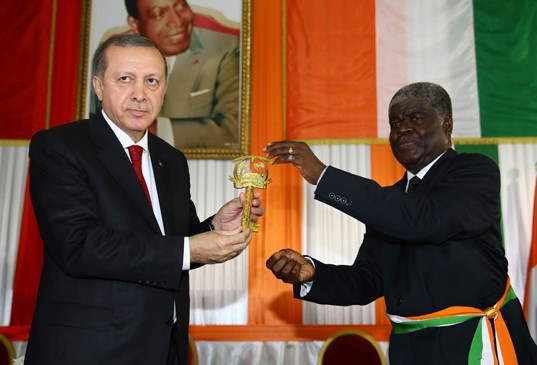Nordic Monitor
Turkish President Recep Tayyip Erdoğan’s ruling Justice and Development Party (AKP) has accelerated the parliamentary approval process for defense industry cooperation agreements with African countries at a time when Ankara is looking to expand its influence further across the African continent.
Following Erdoğan’s visits to Western African countries Senegal and Gambia in January 2020, a defense industry cooperation agreement with Côte d’Ivoire, signed in 2016, was approved by the Foreign Affairs Commission of the Turkish parliament on February 5, 2020. The deal is set to open the Côte d’Ivoire market and that of its Western African neighborhood up to Turkish defense contractors controlled by President Erdoğan.
According to the text of the agreement, obtained by Nordic Monitor, the mechanism covers such areas as the industrial production, procurement and maintenance of military and defense materiel as well as technical and logistical support, information sharing and research in the field.
Turkish Trade Minister Ruhsar Pekcan recently told the state-run Anadolu news agency that Turkey would attach more importance to Africa in 2020, adding that market diversification is important for Turkey because the world faces trade wars and protectionism. Ankara is eager to ink agreements with the Economic Community of West African States (ECOWAS) on economic and trade collaboration, Pekcan noted following a tour of African countries.
The Turkey-Côte d’Ivoire defense cooperation deal is also in line with recent agreements and developments which confirm that Turkey’s defense sector led by Erdoğan-linked conglomerates will assume a central role in shaping the government’s 2020 Africa policy, increasing its influence and strengthening its presence in West Africa.

The agreement states in Article 4 that the parties will provide “appropriate conditions for joint research, development, production and modernization of spare parts, tools, defence materials, military systems, technical displays and technical equipment required by the Armed Forces of the Parties.”
The deal also covers mutual assistance in the fields of production and procurement of defense industry goods and services and the sale of finished military and defense equipment produced through joint projects to third countries as well as technology transfer.
The agreement in Article 4 underlines that the parties should focus on “selling, purchasing or exchange, in line with the relevant legislation of the parties, of surplus defence industry products and services,” adding that they will assist each other in the exchange of “scientific and technical information, relevant documents and information on defence industry standards used by the Parties for Quality Assurance.”
The agreement aims to promote cooperation between military technical institutions, defense industry companies and maintenance and repair facilities, and to facilitate technical visits to research centers and personnel exchanges between the institutions and companies.
The 22-article agreement was submitted to parliament for ratification on February 7, 2019 by President Erdoğan.
The letter submitted to parliament seeking approval of the agreement with Côte d’Ivoire:
Article 3 of the 22-article agreement sets out the framework for the cooperation mechanism in the defense industry and covers the principles of cooperation between authorities and private companies.
Turkey’s Presidency of the Defense Industry (SSM) published a strategic plan for 2019–23 aiming to increase the domestic content of defense equipment to 75 percent and exports to about $10.2 billion by 2023.
In addition to the Balkans and South America, Turkey is targeting Africa as a potential source of clients for Turkish-made defense systems and platforms. According to the DefenceWeb, Turkish defense industry companies participated in the fifth edition of the ShieldAfrica defense exhibition in Cote d’Ivoire in 2019, with Otokar among the companies promoting its products at the event. It is obvious that the Turkey- Cote d’Ivoire agreement will facilitate joint projects and increase Turkey’s defense industry exports to the West African country.
The 13-page defence industry cooperation agreement is posted below:
Similar to Turkey’s bilateral deals with other states, the two sides will form a joint commission to implement the agreement and select projects to be carried out jointly in accordance with Article 7. The joint commission will be responsible for the determination and definition of concrete fields of cooperation, the selection of joint projects, the exchange of information, the submission of proposals, recommendations and opinions to the relevant authorities, ensuring the preparation and publication of necessary documents for realization of approved projects and decisions, regular supervision of the project implementation and assessment of the implementation.
The deal also sets forth conditions for the handling of classified information and documents produced or provided under the agreement, specifying how they shall be exchanged, used and protected. “Classified Information, Documents and Commercially Sensitive hardware and software will be transmitted between the Parties through government-to-government diplomatic channels or through other channels agreed by the Competent Security Authorities of the Parties,” Article 9 (10) states.
The enforcement and details of implementation of the agreement will be defined through complementary and implementation texts, memorandums of understanding, protocols, contracts and arrangements to be signed in accordance with the agreement.
The text was signed on February, 29, 2016 in Abidjan by then-Turkish Minister of National Defense İsmet Yılmaz and Côte d’Ivoire Minister to the President in charge of Defense Alain Richard Donwahi during President Erdoğan’s official visit to the West African country.
The terms of the agreement will be executed by the Ministry of Defense on the Turkish side and the Ministry to the President in charge of Defense for Côte d’Ivoire. The deal is valid for five years with automatic renewal. According to the agreement, either party may notify the other of the intent to terminate at least three months in advance.












